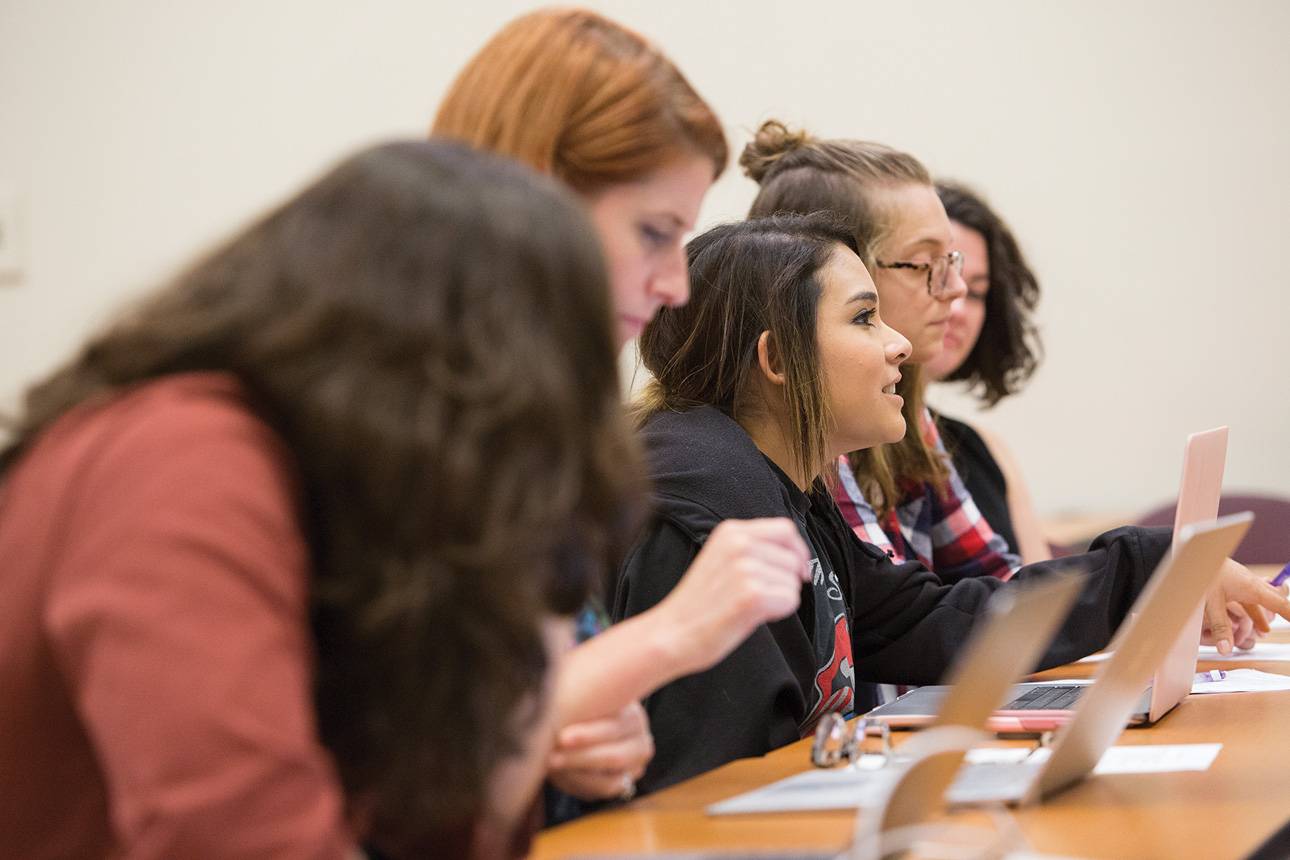The program prepares students to function in today’s diverse, complex media environment.
Digital Media Communication

Program Overview
The program focuses on the importance of storytelling. The curriculum blends theory and research with skills-based courses. Most students complete the program in two years while working full time. Students can also attend the program part-time. Students can earn internship credit, earn credit for study abroad, or take independent study courses to personalize their program.
Course Work
Students earn a master's degree in digital media communication. Students also choose between writing a scholarly thesis or preparing a professional project. Courses address a variety of topics such as media writing, video storytelling, web design, content management, strategic communication campaigns, crisis communication and international communication issues. Students can take classes in face-to-face, online or hybrid formats.
| Degree | Hours | Thesis Option | Location |
|---|---|---|---|
Degree M.A. | Hours 36 | Thesis Option Professional Project | Location San Marcos |
Degree M.A. | Hours 33 | Thesis Option Thesis | Location San Marcos |
For more information on online programs, certifications, and international restrictions, visit our Application Policy Information page.
Program Details
Graduates from the program are leaders, innovators and strategists in media organizations such as The New York Times, CNN, NPR, Khoros, Volusion and more.
Program Mission
The mission of the School of Journalism and Mass Communication is to pursue excellence. The program strives to prepare students for a variety of careers in digital media communication by educating them in theoretical foundations, research, analytical and digital concepts needed to succeed in a changing media industry. The program promotes diversity, scholarly integrity and creativity to produce the next generation of leaders.
Career Options
Students completing the program work in various positions such as web producers, digital strategy/technology consultants, web and social media editors, media relations managers, editors, strategic communication managers and multimedia journalists. Students have also launched their own media businesses offering digital and social media consultancy services. Students change career fields, get promotions or update their storytelling skills for their current positions.
Program Faculty
Graduate faculty have past industry experience and continue to stay current on industry trends. Graduate faculty guide students' theses or professional projects.
Contact us for general questions about your application, funding opportunities, and more. If you have specific questions after reviewing the program details, contact the program's graduate advisor.

Already know that Texas State is right for you?
Application Deadlines
-
For Entry Prior to Summer 2026
DEADLINES U.S. CITIZEN INTERNATIONAL Fall - Priority February 1 February 1 Fall - Standard June 15 June 1 Spring October 15 October 1 -
Effective for Summer 2026 Entry and Beyond
DEADLINES U.S. CITIZEN INTERNATIONAL Fall - Priority February 1 February 1 Fall - Standard August 1 June 1 Spring - Priority September 1 September 1 Spring - Standard November 1 October 1
For important information regarding deadlines and decision timelines, review the Application Policy Information page.
Admission Requirements
The items required for admission consideration are listed below. Additional information for applicants with international credentials can be found on our international webpages.
-
Application
- completed online application
Review important information about the online application.
-
Application Fee
- $55 nonrefundable application fee, OR
- $90 nonrefundable application fee for applications with international credentials
Review important information about application fees.
-
Transcripts & GPA
- Baccalaureate degree from a regionally accredited university. (Non-U.S. degrees must be equivalent to a four-year U.S. Bachelor’s degree. In most cases, three-year degrees are not considered. Visit our International FAQs for more information.)
- A copy of an official transcript from each institution where course credit was granted.
- A minimum overall 2.75 GPA or a 2.75 GPA in your last 60 hours of undergraduate course work (plus any completed graduate courses).
Review important information about transcripts. Official transcripts, sent directly from your institution, will be required if admission is granted.
-
Test Scores
GRE
- GRE not required
Approved English Proficiency Exam Scores
Applicants are required to submit an official English proficiency exam score that meets the minimum program requirements below unless they have earned a bachelor’s degree or higher from a regionally accredited U.S. institution or the equivalent from a country on our exempt countries list.
- official TOEFL iBT scores required with a 100 overall
- official PTE scores required with a 68 overall
- official IELTS (academic) scores required with a 7.0 overall and minimum individual module scores of 6.5
- official Duolingo scores required with a 130 overall
- official TOEFL Essentials scores required with a 10.0 overall
This program does not offer admission if the scores above are not met.
Review important information about official test scores.
-
Documents
- Resume/CV including information on your educational background, work experience, and extracurricular activities.
- Statement of purpose including a professional narrative discussing how the skills learned in the curriculum featured in the M.A. program will be applied in current or future careers. The statement should be no longer than 500 words in length.
- Two letters of recommendation from individuals competent to assess your capacity to pursue graduate education in mass communication. If you did not major in mass communication as an undergraduate student, at least one of the two letters must be from a professor in your undergraduate major. If you are transferring from another institution, at least one of the two letters must be from a professor in your previous institution.
Review important information about documents.